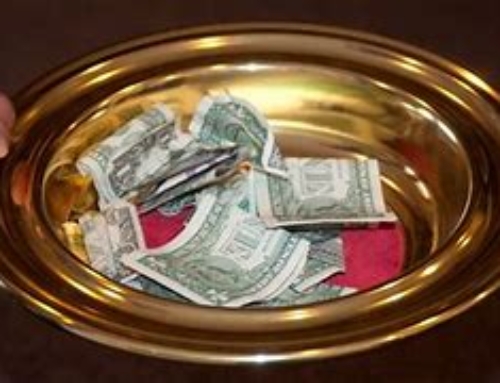Money. Stuff. Greed. Geesh! The problems it causes!
Here’s one from parish life. Some time ago my car was in the shop for repairs so the insurance company put me into a rental car. It happened to be a new Chevy Malibu. My usual car was an eight year old Volvo sedan.
So I park the Malibu in my usual place at church and one parishioner comments, “Ooooh! Looks like Father’s doing pretty well. He’s got himself a brand new car!”
Another parishioner comments, “Poor Father. He’s obviously hard up. He’s had to downgrade from a Volvo to a Chevy….”
So go figure.
How do you begin to sort out the mystery of money? As soon as you start to make judgements about the use of money, expenditure or finances you enter a house of mirrors where nothing is ever quite what it seems.
Have you ever tried to judge another person according to their possessions or expenditure? It’s always a mistake.
So, for example, you see family A living in a fantastic house in the suburbs. They have three new cars in the driveway and every weekend they’re out at their lake house having fun on their jet skis, dirt bikes and flotilla of boats. Then a year later you find out they’ve gone bankrupt and everything they had was on a payment plan and they were deadly in debt. On the other hand you judge family B turning up at church in a beat up old car held together with duct tape and string and it turns out they’re sitting on a pile of family money that they’ve invested wisely and which they use quietly to support umpteen charitable causes.
It’s the same in the church. You see Father Lazarus who belongs to a religious order and goes around in his habit with his vow of poverty, but on his day off he scoots off in his smart two seater convertible for a drive in the mountains and a meal out with some posh friends. Of course he doesn’t own the sports car. He’s taken a vow of poverty. Of course someone else pays for his vacations in Italy which are always a “pilgrimage to Assisi”. One diocesan priest chuckled about the friars, “They make a vow of poverty and we keep it.”
Then you see Father Dives who is in a wealthy parish, drives a new car, lives in a beautiful big rectory which is perfectly furnished and maintained. Then you learn that his predecessor fixed up the rectory like that, a parishioner owns a car dealership and donates a new car to the priest every three years as part of his tithe and the parish is actually in debt because they’ve built a new school for poor kids.
It gets more complicated. Maybe you’re inclined to judge Fr Lazarus harshly, but you don’t know all the facts. Maybe beneath his seeming hypocrisy he’s ashamed that he’s not keeping his vow of poverty very strictly and he wants to do better and furthermore, it could be that his present lifestyle is a great improvement from five years ago. Similarly, when you get to know more about Fr Dives you learn that he is actually quite vain and has a secret stash of money of his own…
Then you get into the management of finances. You find a parish in the poor part of town with what seems very few resources, then you check their books and find that the past four priests never spent anything and the parish is rolling in loot. On the other hand you might find a huge parish with rich parishioners that is in debt because they keep expanding as they are doing the Lord’s work.
Money is a mystery and being a good steward of money is tricky. When you’re weighing up appearances and trying to be a good servant of the Lord it gets even more complicated.
Consider Pope Francis who wants to give a good example and live simply. So he moves out of the Apostolic Palace to live in the St Martha Hostel. Rumors circulate, however, that the cost of renovating the St Martha Hostel to accommodate him and his security people has cost more than if he had occupied the secure and modest papal apartment in the apostolic palace and been done with it.
Friends of mine have a regular house guest we’ll call Sylvia who affects poverty, but she’s very fussy about her food and living conditions causing my friends to observer wryly, “It’s rather expensive keeping Sylvia in the poverty to which she is accustomed…”
This is what I mean by a house of mirrors: you might take a vow of poverty but live like a prince or you might be fabulously wealthy and live like a pauper. Which one is virtuous? Is there a sin in simply having nice stuff and enjoying the good things of life? I don’t think so. Is poverty, on its own, a virtue? No.
Instead, we are to love all things according to their worth and while we enjoy the good things of life we are to be detached. We can take them or leave them, and if we find it hard to leave them, then that’s just the time when we should make some new sacrifice to show that we’re not attached to the wealth we have and the things we enjoy.
The fact is, we’re not all called to poverty, but we are called to simplicity of life. Chesterton said, “There’s more simplicity in a man eating caviar because he likes it than a man eating grape nuts on principle.” If we observe simplicity, generosity and honesty in all things we’re on the right track.
Finally, while we observe simplicity, generosity and honesty we should mind our own business and not judge others. We don’t have all the facts about their finances and judging by appearances will usually get us into trouble and not accomplish anything.







Leave A Comment
You must be logged in to post a comment.